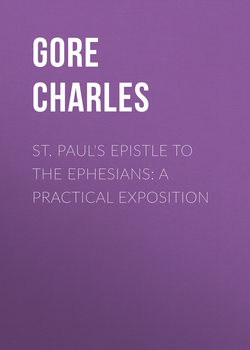Читать книгу St. Paul's Epistle to the Ephesians: A Practical Exposition - Gore Charles - Страница 13
THE EPISTLE TO THE EPHESIANS
DIVISION I. CHAPTERS I. 3-IV. 17
iii
ОглавлениеThe elect
This predestinated body, the Church, is what in another word St. Paul calls the 'elect' or 'chosen.' The idea of election has had a very false turn given to it, partly through mistakes which have been already alluded to, partly because the idea of election has been separated from another idea with which in the Bible it is most closely associated, the idea of a universal purpose to which the elect minister. No thought can be more prominent in the Old Testament than the thought that some men out of multitudes have been chosen by God to be in a special relation of intimacy with Him. 'You only have I known, O Israel, of all the families of the earth.' But this election to special knowledge of God, and special spiritual opportunity, carries with it a corresponding responsibility. It is no piece of favouritism on God's part. The greater our opportunity the more is required of us. 'You only have I known of all the families of the earth; therefore will I visit upon you all your iniquities[83].' The fact is that the principle of inequality in capacity and opportunity runs through the whole world both in individuals and in societies. A great genius or a great nation has special privileges and opportunities, but also, in the sight of God who judges men according to their opportunities, special responsibilities. But also (and this is by far the most important point) the special vocation of every elect individual or body is for the sake of others[84]. It is God's method to work through the few upon the many. That is the law of ministry which binds all the world of strong and weak, of rich and poor, of learned and ignorant, into one. Thus Abraham had been chosen alone, but it was that, through his seed, all the nations of the earth should be blessed. Israel was exclusively the people of God, but it was in order that all nations should learn from them at last the word of God. The apostles were the first 'elect' in Christ with a little Jewish company. 'We' – so St. Paul speaks of the Jewish Christians – 'we who had before hoped in Christ.' But it was to show the way to all the Gentiles ('ye also, who have heard the word of the truth, the gospel of your salvation,') who were also to constitute 'God's own possession' and His 'heritage.' The purpose to be realized is a universal one: it is the re-union of man with man, as such, by being all together reunited to God in one body. And this idea is to have application even beyond the bounds of humanity. Unity is the principle of all things as God created the world. 'In Christ,' St. Paul writes to the Colossians, 'all things consist' or 'hold together in one system[85].' It is only sin, whether in man or in the dimly-known spiritual world which lies beyond, which has spoiled this unity, and in separating the creatures from God has separated them from one another. And the Church of the reconciliation is God's elect body to represent a divine purpose of restoration far wider than itself – extending in fact to all creation. It is the divine purpose, with a view to 'a dispensation of the fulness of the times, to sum up' or 'bring together again in unity' all things in Christ; the things in the heaven, the dim spiritual forces of which we have only glimpses, and the things upon the earth which we know so much better.
This great and rich idea of the election of the Church as a special body to fulfil a universal purpose of recovery, cannot be expressed better than in the very ancient prayer which forms part of the paschal ceremonies of the Latin liturgy. 'O God of unchangeable power and eternal light, look favourably on Thy whole Church, that wonderful and sacred mystery, and by the tranquil operation of Thy perpetual providence, carry out the work of man's salvation; and let the whole world feel and see that things which were cast down are being raised up, and things which had grown old are being made new, and all things are returning to perfection through Him, from whom they took their origin, even through our Lord Jesus Christ.'
83
Amos iii. 2.
84
On the Jewish idea of election, cf. app. note C, p. 261.
85
Col. i. 1.
